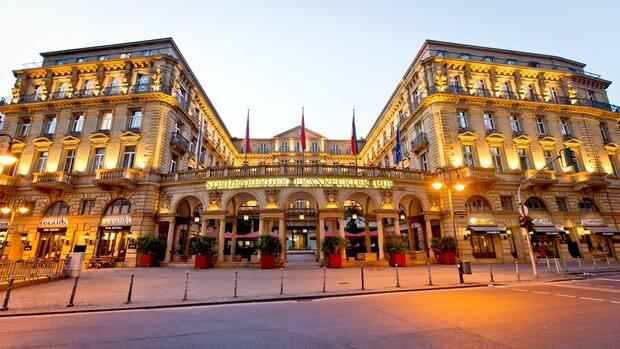The number of overnight stays is falling significantly.
(Photo: dpa)
Frankfurt, Düsseldorf In mid-October, Dorint’s supervisory board chairman Dirk Iserlohe gave the all-clear: sales are back at pre-crisis levels, and room occupancy of up to 67 percent is far better than expected. The struggle for survival of his 62 hotels has paid off, he said happily in an interview with the Handelsblatt.
A few weeks later, the optimism has completely evaporated. In the second half of November, the number of new corona infections rose rapidly and room occupancy in the Dorint houses fell to 45 percent. It is currently just 27 percent.
“Every day there are more cancellations,” reports Iserlohe, “Shareholders’ meetings, seminars, anniversaries and Christmas parties are being canceled in a row.” In December as a whole, he fears, room occupancy will drop to below ten percent.
Ghost games are planned again in the football stadiums, there is a risk of a maximum of 50 people at carnival events, and business trips are currently being drastically reduced. “The number of overnight stays is also going down significantly with us,” confirms a Steigenberger spokesman.
Top jobs of the day
Find the best jobs now and
be notified by email.
At the Cologne hotel chain Dorint, the prospects are so bleak that even the management is now calling for a lockdown. “This is the only way we have the chance of even having a legal claim to compensation,” says Iserlohe.
He’s now calling for a lockdown.
(Photo: Getty Images)
For hotel chains like Dorint, the situation is in a mess. Although the federal government extended the bridging aid (“III plus” and “IV”) until the end of March 2022, the support remains limited to a total of 52 million euros. Large companies with a turnover of more than 100 million euros therefore suspect a distortion of competition. Because while individual hotels get the majority of their losses reimbursed by the state, hostel chains such as Maritim, Steigenberger or Lindner have to be content with partial compensation.
Hotel and restaurant association rejects lockdown
In addition to concerns about the effects of the Corona, there is now a threat of a split in the accommodation industry. A renewed closure of all businesses would be fatal, announced the hotel and restaurant association Dehoga in a press release on Wednesday – and thus contradicted Dorint’s request. “Entrepreneurs and employees alike need planning security,” explained association president Guido Zöllick. The instruments for safe opening are available.
Before any further tightening would be discussed, the existing measures to combat the pandemic should be fully exhausted, says Zöllick. 58.2 percent of its member companies reported that a 2G rule would not be a problem for them.
While Dorint’s supervisory board chairman Iserlohe is calling for a “competition distortion compensation fund”, resistance to all-encompassing state aid is growing even in the travel industry. “The companies have known the situation for almost two years,” says Marija Linnhoff from the VUSR travel agency association. “Entrepreneurship also includes an entrepreneurial risk.”
She cites the Stoffregen travel café in Dortmund as a positive example. Because the booking business there was only moderately recently, branch manager Michael Draeger resorted to a clever trick at the end of October: In his premises he now also offers vaccination campaigns against Corona.
In Munich, too, the rental car broker Sunnycars reacted to the corona-related business slump with plenty of entrepreneurial spirit. The management now employs part of the workforce for a newly established business area: the sale of air filter systems.
The hotel industry has also recently shown itself to be just as imaginative. Steigenberger successfully boosted private customer business with Black Friday discounts and pushed business with hybrid events, some of which are broadcast on the Internet.
So far, Lufthansa has only felt a few effects
So far, however, the desire to travel far away has only occasionally slowed the spread of Omikron. The flights around Christmas and the turn of the year are still very well booked, according to Lufthansa. “Only in the case of short-term bookings are we seeing occasional cancellations on individual routes,” said a spokesman for the airline group.
The customers obviously do not fear any stricter travel restrictions on their long-haul trips. Most countries have long required proof of vaccination or convalescence and a negative PCR test. 2G plus or 1G plus has long been a reality in many places.
Nevertheless, the number of infections in flight operations, which has risen sharply again in many countries, sometimes causes problems, but in other areas. The Lufthansa Group’s new tourism airline, Eurowings Discover, had to give up its plan to head for Cuba from mid-December. Because of the pandemic situation on the Caribbean island and the entry restrictions, it was unfortunately not possible to set up the location necessary for smooth operation, according to the airline.
The current incidence in Cuba is only around ten, but in August the value was close to 600. Now the destination of Varadero in Cuba is not to be added to the program until the coming winter 2022/23. However, Cuba is an isolated case and there are currently no changes in the flight schedule, according to Eurowings Discover.
More: Airlines and travel providers are threatened with the next crisis – the industry is relying on the flight reflex.
